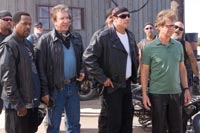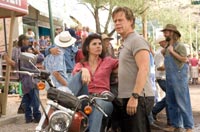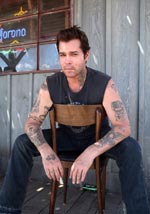Lifelong friends run into mid-life crises ranging from low-level malaise to marital breakdown. They decide to embark on an adventure together, taking themselves out of their comfort zones in an effort to reclaim their youth or at least rediscover their spirit. Hilarity ensues, buddies bond, and the men emerge walking funny but with the realization they have a lot to live for.
If you’re old enough to relate to this premise, it will likely remind you of City Slickers. The bad news: Wild Hogs is no City Slickers. The good news: While utterly lacking in subtlety, surprise, or nuance, Wild Hogs has some genuinely funny scenes, and a decent enough cast (particularly the reliable William H. Macy) to mostly distract its audience from its mediocre script.

Doug (Tim Allen) is a dentist with a spacious home and a loving, supportive wife (a woefully under-used Jill Hennessy). His only real problem: His tween-aged son doesn’t think he’s cool. Doug begins to examine his life (and spreading waistline) and wonders if he might need a little more adventure.
Bobby (Martin Lawrence) is a plumber whose yearlong writing sabbatical has just been brought to a forceful close by his overbearing wife (a woefully stereotyped Tachina Arnold). The complete lack of respect for him in his household, coupled with a catastrophic toilet-incident his first day back on the job, get him looking for a chance to reassert his manhood (or maybe just get out of town).
Dudley (William H. Macy) is a geeky computer programmer whose inability to talk to women has kept him a pining bachelor. He’s ready to do something drastic—like get a tattoo of the Apple Computer logo on his right bicep, or maybe even get his shiny Harley dirty on the back roads of America.

Woody (John Travolta) is the friend who has it all together, except for the fact that his supermodel wife has left him and he’s free falling over the edge of bankruptcy. Woody isn’t ready to tell his friends about the left-turns his life is making, but he is ready to goad them into a motorcycle trip from their Cincinnati homes to the Pacific Ocean. Given that all four men live for their Saturday rides on their Harleys, Woody doesn’t have a hard time convincing them that a road trip is just what they need.
Screenwriter Brad Copeland has until now been primarily a sitcom writer (My Name Is Earl, Arrested Development) which may explain the episodic feel of Wild Hogs. Once the guys hit the road, they ride from mishap to mishap with lulls not unlike commercial breaks in between. They throw away their cell phones. A gay cop (Scrubs’ John C. McGinley) misunderstands the nature of their male bonding. They run out of gas and wish they still had their cell phones. They argue with each other over the correct disposal of human waste in the woods. And so on. Some of these episodes are laugh-out-loud funny, others are groan-out-loud lame. Either way, they just keep coming.

The second half of Wild Hogs centers on the heroes’ run-in with the Del Fuegos, an easily angered New Mexico biker gang led by Cro-Magnum-esque Jack (an over-the-top Ray Liotta). The film finally hits on all cylinders during its final act, when a supremely well-choreographed conflict between the guys and the gang works by making the most of physical comedy and the least of dialogue. Add in a perfect cameo by a biker movie icon and a hilarious epilogue while the end credits roll, and you’ve got a strong to finish to an otherwise middling trip.
Wild Hogs is directed by Walt Becker, whose resume is dominated by the Van Wilder films, so perhaps it should come as no surprise that this movie is sporadically characterized by a National Lampoon-like vulgarity. The problem lies in the fact that Wild Hogs also tries, rather clumsily and with only the sketchiest character development in place, to operate at some deeper and more mature levels. Macy and Marisa Tomei make the most they can of their sweet but flimsy love story. But when Becker and Copeland want to explore any given character’s angst, they bring the silliness to a screeching halt to have one actor say to another, “You look a little down.” While the experience level of the cast saves the movie from disaster, it also hints at what could have been had the filmmakers developed a more even tone and a less lazy script. Wild Hogs ultimately can’t live up to the promise of its premise and its participants.
Still, the movie is almost certainly guaranteed to make you laugh. In fact, at the screening I attended, there was more audible laughter in the theatre than I’ve heard in a long time. If you’re patient, and you can overlook some sophomoric misfires in a movie that clearly should know better, the final 20 minutes of Wild Hogs will reward your endurance. It’s a wildly uneven ride, but it finishes well.
Talk About It
Discussion starters- Early in the movie, Doug is disappointed to realize that his son would rather play basketball with a friend’s dad than with him. Is separation between a teen and his or her father natural? Should parents “pursue” their children, or give them space?
- Christian writer John Elridge has written extensively about a universal male need to be challenged and have adventure. Do you believe this to be true? If so, and if you are male, do you have healthy outlets for this need in your life? If you are the spouse of a male, do you perceive this as a priority for your husband?
- In the biblical story of David and Jonathan, two friends vow their friendship to one another for life (see 1 Samuel 18). Wild Hogs, for all its vulgarity, operates on the rather refreshing assumption that men can form strong life-long friendships. Have you made committed friendships a priority in your life? Is there a friend you have formally or informally made a covenant with?
- Bobby’s wife expects him to return to work after a year of book writing has not yielded tangible results. How does a responsible adult determine how long to pursue a dream? How long should a spouse support a dream without results?
The Family Corner
For parents to considerWild Hogs is rated PG-13 for crude and sexual content, and some violence. While the violence is mostly cartoonish slapstick, there is frequent vulgar and profane language and strong sexual innuendo, often of a homosexual (and even oddly homophobic) nature.
Photos © Copyright Buena Vista Pictures
Copyright © 2007 Christianity Today. Click for reprint information.











